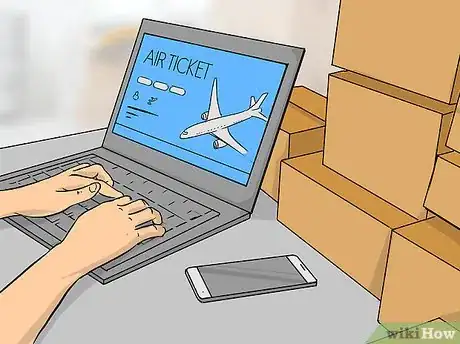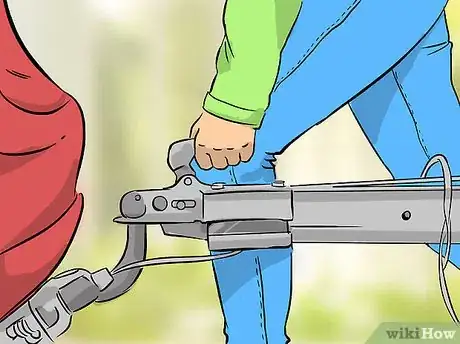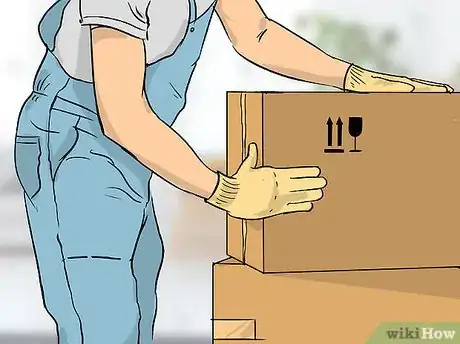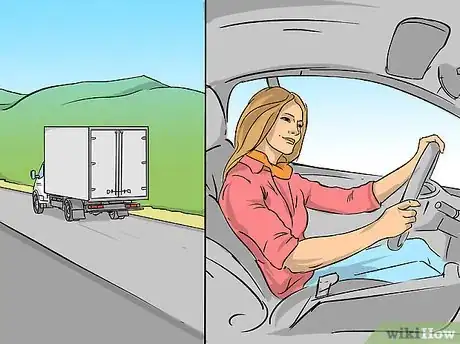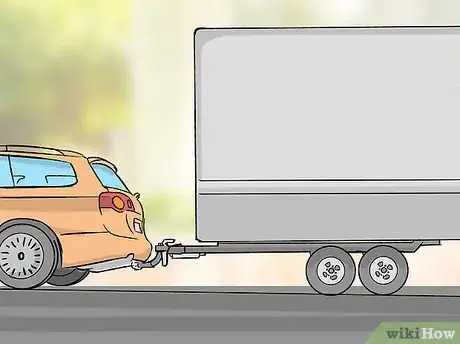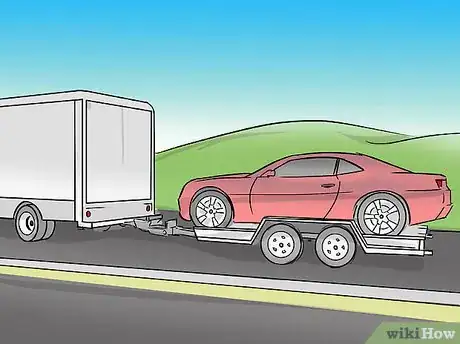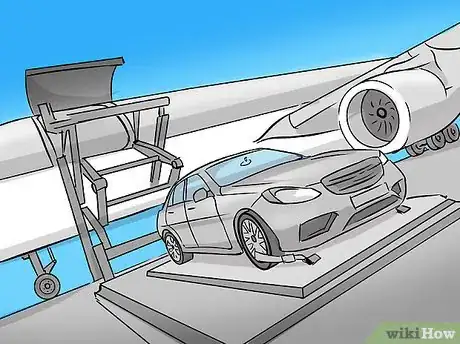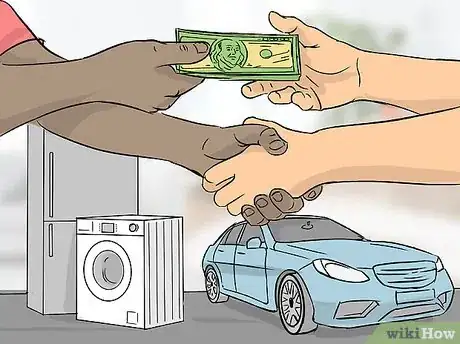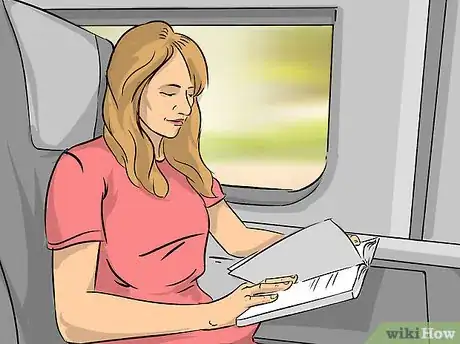This article was co-authored by Angela Rice. Angela Rice is a Luxury Travel Specialist and Co-Founder of Boutique Travel Advisors, a luxury travel advising business in Phoenix, Arizona. Angela specializes in consulting and curating highly customized and unique travel itineraries for clients seeking luxury, group, and multi-generational family travel. Angela studied at Arizona State University and The University of Iowa Tippie College of Business. She has prior consulting experience in accounting and business, which helps her run her business behind the scenes. Angela has been featured in The Washington Post, Reader's Digest, Travel Weekly, USA Today, Travel Market Report, Phoenix Magazine, and MSN. She is also a frequent guest on WBBM News Radio 105.9 FM's Travel Tuesday show.
This article has been viewed 741,471 times.
If you're moving long distance, you have several options to choose from. You can fly and have your possessions shipped, you can drive your own vehicle and tow your possessions in a trailer, or you can rent a moving truck and tow your vehicle on a hitch. You can also rent a crate, pack at your leisure, and have it shipped to you. By doing some preliminary research, you can figure out which option is going to be the cheapest and most enjoyable for you.
Steps
Itemize
-
1Take an inventory of your possessions. Take stock of everything that you own, particularly vehicles, furniture, and heavy things that take up a lot of room.[1]
- How much are these items worth?
- If it costs more to ship these possessions than to buy new ones, are you willing to let them go?
-
2Take photographs to document everything of value. This will give you a time stamped record of the condition of your possessions.[2]
- If you choose to purchase insurance, be sure to get replacement cost only insurance. The other kind is literally based on the replacement cost of weight, not value.
Research
-
1Research the cost of airfare. If you have any flexibility around your moving date, use the "flexible date" feature with online booking sites to figure out when the cheapest flights are.
- Look into how much baggage an airline allows you to bring along. In some cases, you can bring up to 100 lbs of luggage with you, and additional luggage can be checked at a reasonable price. This can be useful if, say, you want to bring your computer with you for fear the movers may ruin it. You can wrap a computer tightly in bubble wrap and pack in a suitcase as part of your luggage allowance.[3]
-
2Get quotes for trailers and moving trucks. There are many different options. Be sure to do your research and write down all quotes. Once you do the math, you'll be able to assess what will work with your resources.
- Plan ahead if you need a hitch! If you need a hitch for your vehicle, make sure they will have hitch in stock. Sometimes you have to order it and it takes a few days before it will arrive.
- If you rent a moving truck, how much will it cost to rent the size you need, and how many days and miles will that rate cover?
- If you have a vehicle, how much would it cost to pull the vehicle with a tow dolly? It might also be cheaper to do things the other way around: Drive your vehicle and tow a trailer. How much will that cost?
-
3Investigate moving companies. Find out how much it'd cost to hire a full-service moving company (this might be easier on your back and your possessions in terms of loading and unloading, see Warnings below).
- You can also look into "self move" services, which drop off a containing unit, let you load it at your leisure, and pick it up and transport it for you.
- There are sites where you can describe your needs and people will make bids as to how much they'll charge to do it for you. As with all your research, you want to ask how much it'll cost, how long it'll take, and how you're guarded against damages.
- Books can often weigh a personal vehicle down significantly. Fear not! They can be shipped through the USPS at 'media rate'.[4] Another often ignored option is using the greyhound shipping service which offers a huge discount to students. Both options allow you to pick up your items as much as 2 weeks later which is useful if you don't know where you are moving to!
-
4Determine the reliability of your vehicle. Do you trust that you can drive it over two thousand miles without worrying about it breaking down on you? Does it need any major repairs before it can withstand such a trip?
- Most automobiles, reliable or not, should receive a major maintenance visit to the mechanic (with special attention to radiator, transmission, and brakes) before embarking on a cross-country trek. The cost of the maintenance could save thousands (literally) in emergency repairs, towing, etc.
- If you're considering pulling a trailer, does your vehicle have enough horsepower to pull it across the distance and landscape you're looking at?
- Driving across a country often means driving across different elevations, climates and terrains. Can your vehicle make it up and down a few mountains? Are the brakes in good shape? Does it have a tendency to overheat? Do the air conditioner and the heat work?
- Check the weather. Weather.com and similar websites can actually give you the weather of your travel route. Consider things like mountain passes, if possible avoid them or be prepared to put chains on your vehicle if the situation requires it. Map your destination online and don't leave home without a current Road Atlas. Decide if investing in a satellite navigation system for your car is within your budget.
Calculate
-
1Calculate the cost of driving your vehicle. Determine the fuel efficiency of the vehicle you'll be using so that you can estimate how much the fuel will cost.
- Find out how many miles or kilometres your trip will cover, then divide that number by your MPG (miles per gallon) or km/l (kilometres per litre). That will tell you how much fuel you will need to cover the entire journey. Multiply that number by the current or expected price per gallon/price per litre to see how much money you'll be spending on gas through the whole trip.[5]
- Example: If your trip is 2,000 miles and your car gets 30 miles per gallon, then 2,000 miles / 30 miles = 66.5 gallons, approximately. If the price of fuel is at about $4 per gallon, the fuel will cost 66.5 gallons x $4 = $266.
- Example: If your trip is 1,000 kilometres and your vehicle travels 15 kilometres per litre, then 1,000 km ÷ 15 km/l = 67 litres, approximately. If the price of fuel is at about €1 per litre, the fuel will cost 67 litres x €1 = €67.
- Remember that the MPG or the km/l of your vehicle will be reduced if you'll be towing a trailer or adding considerable weight to the vehicle in any way.
-
2Make a realistic list of road trip costs, primarily food and lodging.
- How long will driving take?
- If you must stay in hotels or motels, how much will it cost you? How much will you spend on meals and snacks?
- Do you plan on sight-seeing on your way, perhaps tasting some wine, or visiting old friends?
-
3Shop around for vehicle shipping rates. There are companies that specialize in shipping vehicles across long distances. Make phone calls and ask the following questions:
- How long will it take?
- How much will it cost?
- How am I guarded against damages to my vehicle?
- What is this company's reputation? You can usually find reviews online.
Evaluate
By now, you've done enough research to be able to put price tags on all of the potential moving scenarios. Now you must compare your options not only by cost, but also by other considerations, like enjoyability. Here are a just a few different scenarios of what you can do.
-
1Scenario One:
- Drive vehicle, have possessions shipped.
• Consider increased likelihood of damage to your possessions if they're in someone else's hands.
• Driving the vehicle rather than shipping or towing it will mean more wear and tear on the vehicle.
• Most conducive to sight-seeing.
- Drive vehicle, have possessions shipped.
-
2Scenario Two:
- Drive vehicle, tow trailer with possessions.
• Consider decreased likelihood of damage to your possessions if they remain in your hands.
• Driving the vehicle rather than shipping or towing it will mean more wear and tear on the vehicle.
• Towing a heavy trailer will place additional strain on your vehicle, and you may need to have a hitch installed.
- Drive vehicle, tow trailer with possessions.
-
3Scenario Three:
- Drive rental truck with possessions, tow vehicle.
• Consider decreased likelihood of damage to your possessions if they remain in your hands.
• Less wear and tear on the vehicle.
- Drive rental truck with possessions, tow vehicle.
-
4Scenario Four:
- Drive rental truck with possessions, ship vehicle.
• Consider decreased likelihood of damage to your possessions if they remain in your hands.
• Less wear and tear on the vehicle, but greater chance of vehicle being damaged or scratched.
• Have a backup car at your destination in case the vehicle transportation takes longer than expected.
• Can tow a trailer behind the rental truck for bringing additional possessions.[6]
- Drive rental truck with possessions, ship vehicle.
-
5Scenario Five:
- Fly to destination, have possessions and vehicle shipped.
• Consider increased likelihood of damage to your possessions if they're in someone else's hands.
• Less wear and tear on the vehicle, but greater chance of vehicle being damaged or scratched.
• Easier but more expensive when children are involved.
• Have a backup car at your destination in case the vehicle transportation takes longer than expected.
• You might get to your destination before your possessions do.
• Can bring some possessions on the plane.[7]
- Fly to destination, have possessions and vehicle shipped.
-
6Scenario Six:
- Sell the car and other heavy items. Ship the rest. Fly to destination. It may be cheaper or only slightly more expensive to sell car, and other item first and then buy newer items at the destination. Take into account of the cost of shipping these heavy items and buying newer items at destination. One gets to enjoy newer technology in the case of tv, computer, and car.
Community Q&A
-
QuestionWhen hiring a moving company for a cross country move, how long before my things arrive at my new place?
 Community AnswerIt depends on where exactly you are moving to and from, as well as the stuff you're moving and the company you hire. But usually it takes 2-5 weeks.
Community AnswerIt depends on where exactly you are moving to and from, as well as the stuff you're moving and the company you hire. But usually it takes 2-5 weeks. -
QuestionWhich company has the best reliability for moving long distance by using containers, or pods?
 Community AnswerResearch online reviews. All moving companies will get it there. The price is the big difference.
Community AnswerResearch online reviews. All moving companies will get it there. The price is the big difference. -
QuestionHow do I pack pictures to be transported?
 Community AnswerPicture frames should be placed in small to medium paper-lined boxes in stacks no more than 8 inches high with crumpled paper in between each piece. Wrap frames in packing paper. Top frames with more packing paper to ensure items don't move around in the box. Pictures that are over 3 feet in size should be secured with a moving blanket, plastic wrapped, and moved separately.
Community AnswerPicture frames should be placed in small to medium paper-lined boxes in stacks no more than 8 inches high with crumpled paper in between each piece. Wrap frames in packing paper. Top frames with more packing paper to ensure items don't move around in the box. Pictures that are over 3 feet in size should be secured with a moving blanket, plastic wrapped, and moved separately.
Warnings
- Shipping companies keep your items until you pay extra fee found only in fine print at bottom of the contract. Read the contract!⧼thumbs_response⧽
- The moving company should have their name on a truck and be licensed and insured. Ask these questions and try to do an in-person estimate with the mover to verify these items.⧼thumbs_response⧽
- If you don't balance the load on the trailer properly or the weight of the trailer exceeds recommended towing capacity, your cross-country road trip may very well become a disaster, especially with the variables you will encounter.⧼thumbs_response⧽
- If your health is poor, loading and unloading a moving truck or trailer on your own is probably not a good idea. Find reputable movers to do it for you.⧼thumbs_response⧽
- Unless you are experienced with towing heavy loads, get advice on how you should drive your truck across the country. Winds can literally tear a trailer-towing car off the highway, and traction is minimal when the load behind the car exceeds the weight of the tow vehicle.⧼thumbs_response⧽
- When you evaluate the moving company, make sure they have a Department of Transportation (DOT) number and Motor Carrier (MC) number.⧼thumbs_response⧽
Expert Interview
Thanks for reading our article! If you'd like to learn more about moving sales, check out our in-depth interview with Marty Stevens-Heebner, SMM-C, CPO®.
References
- ↑ http://www.lintvanlines.com/tips-for-taking-inventory-before-your-move/
- ↑ http://www.lintvanlines.com/tips-for-taking-inventory-before-your-move/
- ↑ https://thepointsguy.com/guide/comparing-checked-bag-fees-domestic-flights/
- ↑ https://faq.usps.com/s/article/What-is-Media-Mail-Book-Rate
- ↑ https://learn.eartheasy.com/guides/how-to-calculate-gas-mileage/
- ↑ https://www.fool.com/retirement/2017/08/25/5-cheap-ways-to-move-cross-country.aspx
- ↑ https://azbigmedia.com/tips-for-moving-across-the-country/
About This Article
To move cross country, consider having all of your personal items shipped and then driving to your destination in your vehicle. You could also rent a trailer and tow all of your items instead of shipping them. To avoid putting a lot of miles on your vehicle, you could rent a moving truck and tow your vehicle instead, or have your vehicle shipped to your new destination. If you'd prefer to fly cross country, have your vehicle and belongings shipped so they're waiting for you when you arrive. To learn how to find a good moving company, scroll down!


